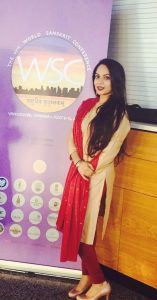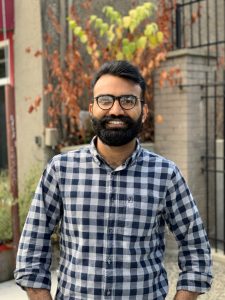Harsimran Sachdeva


Tell us a little about yourself, your background, and how you became interested in the Punjabi Studies program?
I come from a Sikh Punjabi background and basically grew up in Minnesota, which is in the mid-west of the United States. I was perhaps the only girl of South Asian ethnicity in my high school and acutely felt the void of not being in close proximity to my cultural heritage. I tried to stay connected and negotiate aspects of my identity through cultural forms of song and dance however, I always felt that an academically focused understanding of the region was lacking. Once I came to UBC, I knew I wanted to pursue a program that had a global focus. I eventually veered towards the Asian Studies Department because I found courses on topics that I was incredibly passionate about – pertaining to the history and languages of South Asia. I eventually decided to pursue a degree in South Asian Languages and Culture since it gave me the tools and perspectives to transcend the contemporary political boundaries and connect with the region in a more meaningful way.
What has been the most memorable or impactful moment of your undergraduate/graduate experience in Punjabi studies?
During this past reading break in February, I was fortunate to be one of 15 UBC students that were selected to travel to Punjab, India and be part of a Joint Undergraduate Forum in partnership with Punjabi University Patiala (PUP). While this wasn’t my first time in Punjab, it certainly had a profound impact in shaping my understanding of the region. During our trip, we were privileged to visit sites of historical and religious significance in the cities of Patiala and Amritsar, which enabled me to perhaps not only solidify concepts that I was being exposed to in the classroom here at home but also allowed me to access and experience Punjab through the eyes of my fellow peers from UBC and PUP. I am incredibly grateful to Dr. Anne Murphy for spearheading this program, which gave my cohort memories that we will forever cherish.
Could you explain why Punjabi studies at UBC is important? What can you tell students who are considering taking Punjabi, Asian Studies, or Punjabi related courses?
I believe that the sheer strength, in terms of numbers at least, of the Punjabi diaspora within Canada is a sufficient reason to justify the benefits of the Punjabi Studies program at UBC. The courses in this program do not only familiarise students with the geographic region of Punjab, on both sides of the border, but also connect it with the experiences of Canadian Punjabi culture and community. I have taken courses with Dr. Anne Murphy on early-modern Punjabi literature as well as Modern Punjabi literature in which the voices of the Punjabi diaspora are emphasized. The variety of the courses have undoubtedly enhanced my understanding of South Asia as well as of the South Asian experience in Canada and is therefore relevant to the society in which we live. The advice I would give students is not to solely focus on satisfying credit requirements but also being open to the many courses the department has to offer. Some of my favorite courses have been those that I took out of sheer curiosity. The department has some of the most amazing faculty and I would try to take advantage of our accessibility to them.
What are your current academic or career goals upon completing your program? How do you think UBC Punjabi studies is helping you achieve these goals (or has has helped you accomplish your goals)?
I just recently finished my coursework for my bachelor’s degree and am now preparing for graduate school admissions exam. My goal is to earn a joint law and master’s degree in South Asian diplomacy. I hope to eventually support the easing of tensions in South Asia through political mediation and conflict resolution. The courses I have taken within the Asian Studies department are directly relevant to my career aspirations. Given that I want to work across the political boundaries, I took courses in various South Asian languages including Punjabi, Urdu, and Persian. The extensive language and history related courses in the department as well as the access to esteemed faculty at UBC makes this program unparalleled to others in North America.
Why did you choose Punjabi studies at UBC? Was there an aspect of the program or location that was attractive to you compared to other programs in Canada or internationally?
When I came to UBC, my plan was to study history and I was even admitted to their Honours program. But I eventually decided to take another path and pursue a major in Asian Studies because their focus was on issues that I was deeply passionate about. I realized I love learning languages and still continue my individual study of the languages I studied at UBC. I also found amazing mentors in the department, Dr. Anne Murphy, Dr. Adheesh Sathaye, Dr. Tara Mayer, Dr. Thomas Hunter, and Dr. Hasan Siddiqui, that inspired me to pursue this field and still continue to guide me towards attaining my career goals.
Arafat Safdar


Tell us a little about yourself, your background, and how you became interested in the Punjabi Studies program?
I was born and brought up in Okara, Pakistan. I completed my early education from there and then moved to Lahore to pursue a degree in law from Lahore University of Management Sciences (LUMS). Initially, I studied Accounting and Finance (ACF), apparently the most coveted major at LUMS, however, I soon lost my interest in that subject. (In fact, I was never interested in that at all.) I became more interested in history and literature and took many courses from these two disciplines. I came across many people at LUMS, both from the student body as well as the faculty, who encouraged me to pursue my interest and supported me throughout. Especially, Dr. Ali Usman Qasmi who has been very kind to me and has guided me through thick and thin. Similarly, there was Dr. Muhammad Azeem who encouraged me to pursue higher studies, given my interest in the disciplines of history and law. Outside LUMS, I was fortunate enough to spend time with Dr. Mubarak Ali, an eminent historian whose exemplary. I am forever indebted to these people for having fostered my intellectual curiosity.
What has been the most memorable or impactful moment of your undergraduate/graduate experience in Punjabi studies?
There have been many, which makes it easier to choose one. Perhaps, the most impactful moment for me has been learning the Gurmukhi script. I have to thank Dr. Anne Murphy, my academic supervisor, for this as she made me realize the importance of learning the script and then also actively helped me learn it. Although I am not very fluent at it yet, still learning the script has opened a new world for me. The script has enabled me to move across the border (only figuratively, of course!) and explore the other half of Punjab as well. This has also made it possible for me to visualize the Punjab and the diversity it contains within its bounds. This is very helpful for me as a student of history who is invested in studying the colonial history of Punjab.
Could you explain why Punjabi studies at UBC is important? What can you tell students who are considering taking Punjabi, Asian Studies, or Punjabi related
courses?
I think the Punjabi Studies program is doing a great job in promoting the Punjabi language in the context of North America. I have benefited enormously from the program as I have learned the Gurmukhi script (as I have mentioned earlier). Now, I am working on the Punjabi classics, such as Hir Waris Shah. It is noteworthy that the focus here is not entirely on the academic side of Punjabi but also on the co-curricular activities. Students associated with the department also get to display their thespian talents (notably on the annual events), along with the musical renditions of Punjabi classics. Such a multi-pronged approach makes the whole experience worthwhile.
What are your current academic or career goals upon completing your program? How do you think UBC Punjabi studies is helping you achieve these goals (or has has helped you accomplish your goals)?
While working on my coursework, I have developed an interest in the discipline of legal history. As I am working on the Criminal Tribes Act, I believe the exploration of this Act vis-à-vis Punjab has been lacking in many respects. After my MA thesis, I want to conduct a detailed study of the Act itself and its impact on the region now halved into two Punjabs. Although the Act has been long repealed, it continues to affect the lives of countless Punjabis who were once classified as criminals and the fact that this Act has not been adequately studied in the context of Punjab makes their suffering worse. In the current program, I get many opportunities to discuss my research with Dr. Anne Murphy who is always very approachable and helpful, and also with Dr. Hasan Siddiqi who is always willing to discuss my research and give me useful insights.
Why did you choose Punjabi studies at UBC? Was there an aspect of the program or location that was attractive to you compared to other programs in Canada or
internationally?
While I was applying for MA, I did an extensive research on the universities in the North America. I found out that the Punjabi Studies program at UBC is the best program in the North America. This program struck me in particular because of its vast range and perceptive depth. I wanted to focus on the colonial history of Punjab, along with learning about the dynamics of modern Punjabi history. This program is ideal for me to balance these two goals.


